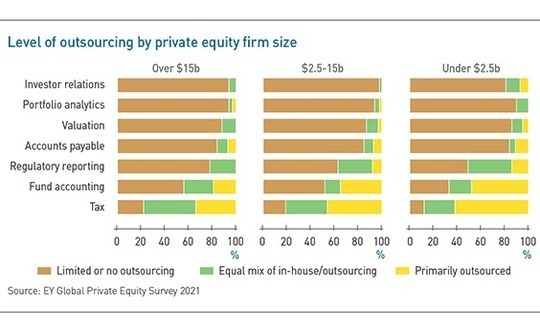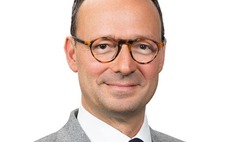
COOs in Asia private equity: Horses for courses

The COO role is gradually becoming more prevalent in Asian private equity, but GPs struggle to find the right combination of financial skills and business acumen. The optimal candidate is often internal
Bonnie Lo, one of four founders of NewQuest Capital Partners, became COO in 2017 in the absence of a viable alternative. The Asia secondaries specialist spent 18 months looking for a CFO, someone who could work alongside the existing financial controller as more of a business-oriented presence and relieve the burden placed on the founders. But a suitable candidate failed to materialize.
Applicants were either CFOs and too accountant-like or investment professionals with insufficient finance experience. Lo was already overseeing many of NewQuest's operational functions, so she volunteered to take on the CFO duties in a COO role. With 14 people across three teams – administration, finance and tax, and investor relations (IR) – reporting to her, Lo claims to wear between six and eight different hats. And the pace is relentless.
"NewQuest is in a constant growth phase, every year there seems to be some special project," Lo explains. "I tell the team that next year is going to be better because things will stabilize, and then something new happens. Even if we wanted to hire, it would take time to train someone up and we get into situations where the team has no time to do training. There is a danger of burnout."
This is not an unusual experience among private equity firms in Asia. The region abounds with tailwinds that prompt aggressive reevaluations of the investment opportunity, resulting in larger funds and new strategies. The front office evolves faster than the middle and back offices – it effectively pays the bills – which means the appetite for investment exceeds the underlying infrastructure intended to facilitate it.
Many GPs are reaching a tipping point, having reached critical mass in terms of people and assets, while grappling with a heavier administrative burden across regulatory compliance, reporting and disclosure, and risk management. It might make sense to appoint an individual to manage these growing pains, but there is no one answer as to who that should be and how their role is defined.
"You are a facilitator across the firm, which means empathy and influence are of paramount importance. It is not easy to find those skills," says Patrick Cordes, COO of Baring Private Equity Asia. "At the same time, you need entrepreneurship and general business sense. You are there to keep the organization running, which means preserving the entrepreneurial culture while managing the heavier compliance burden. It starts with seeing who you have in the role and whether they fit that."
The right fit?
The idiosyncratic nature of the COO in private equity might explain the difficulties in finding people through external searches.
"There is sometimes a lack of clarity as to what you want this person to do and where you see them fitting in," says Michael Di Cicco, global private markets leader for Asia Pacific at Korn Ferry. "You might have a laundry list of things you'd like and no clear idea as to what the most important ones are, so you end up with someone who can do the most things on the list."
When firms are at an early stage, core functions such as risk and compliance, operations, human resources, financing and accounting, and IR are typically divided up between the CFO and CEO or founder. The CFO's duties might encompass everything that doesn't fall under fundraising and investing. In time, COO becomes a more accurate description of the job.
Japan-based Phronesis Partners has one sub-$100 million fund, two managing partners who split the CEO and CFO duties, and a back-office staff of four. When Takahisa Koitabashi switched from COO to CFO, it didn't so much reflect a change in remit as clarification that he wouldn't be leading any new deals. A slightly larger China-focused GP describes the COO role as "a luxury I cannot afford." He lists operating partners and an IR executive as bigger priorities when resources permit expansion.

"You can't afford to take investment professionals and have them working on that part of the business part-time," says Jun Tsusaka, the firm's founder and managing partner. "When you're a start-up you don't have the resources to hire a full team, so people in the back office wear several hats. As the firm evolves you think about how you manage the business. Evolution suggests growth – more people, asset classes, and portfolio companies – and you need to professionalize that."
Like NewQuest, NSSK conducted a search for a third-party manager but decided that an internal hire would be best. Akiyama has been with the firm since inception, sits on the management committee, and is familiar with the investment side of the business – which translates into respect from the investment team and the authority to deal with LPs. He will ultimately return to investments.
Tsusaka acknowledges he is weakening NSSK's investment capabilities in the near term with a view to delivering institutional strength in the long term. He also emphasizes the challenges of finding people for senior non-investment roles.
"CFO is one of the hardest jobs to fill because the title is too narrow in many regards. COO has different connotations as well: a management committee member who runs the back office is effectively running the firm," he explains. "You can find a bean counter who will making sure there are no mistakes in the numbers, but that's just one part of the business."
Everstone Group, which has multiple strategies and primarily operates in India and Southeast Asia, addressed the CFO-COO dynamic by appointing two chief business officers. Ashutosh Lavakare, who sits in Mumbai, is an accountant-turned-CFO, while Singapore-based Sanjay Gujral started in private equity on the investment side. The idea is that they complement one another.
The CF&OO
Many firms have a more traditional division of responsibilities between CFO and COO: the former concentrates on accounting and financial reporting, while the latter is responsible for interpreting this information and deciding what to do with it, whether that involves engagement with LPs, working on portfolio management issues, or handling internal resources and processes. Allegro Funds Group is a case in point.
When Robert Thorpe joined the Australia-based manager from Macquarie Group in 2016, his duties as a finance director included arranging financing facilities and managing capital calls. Thorpe was promoted to COO as Allegro's business became larger and more complex. He now spends 15% of his time on finance, with areas such as regulation – ongoing communication with regulatory agencies – and risk management the bigger burdens.
"We've seen the emergence of a new consolidated role, the CF&OO, because it's too difficult to slice the roles. If you did that, you might end up creating a gap into which things would fall – and the gap between finance and operations is too important to go untended," Thorpe says. "Firms either have a CFO who takes on the operational responsibility or a COO who takes on the finance responsibility. I was made managing director for finance and operations."
When there is a willingness to consider external candidates that can coordinate operations as an organization scales, head-hunters typically look in three places: banks, multi-asset management firms, and other GPs.
Someone who comes from the COO or busines management function of a bank can be a good fit. They have usually run sizeable teams across different geographies, bring experience of working with senior stakeholders and operating under high-level compliance regimes, and may have handled administrative duties in running an equities desk or a corporate finance department. There is also likely to be some pre-existing understanding of the private equity ecosystem.
There are two potential drawbacks. First, do they want the position? Amy Fong became COO of FountainVest Partners in 2019 after a career in banking that included stints as Greater China COO for Credit Suisse and Asia COO for global banking at HSBC. However, prior to FountainVest, she spent four years running Save the Children in Hong Kong, building it into a 40-person operation. Without this interim step, she would have gone from overseeing thousands of people to overseeing 70.
"A lot of the skillsets in terms of connecting the dots, making sure everyone is well-coordinated and marches to the same agenda are necessary and relevant," Fong says. "But for someone who is used to working in a big bank, going to a smaller organization where you are much more hands-on, it might be a difficult transition. At Save the Children, I rolled up my sleeves and did everything myself. I showed that I could bridge that gap."
Second, will the incumbent investment team accept a third-party manager? Arthur Leung, a consultant in the Asia financial services practice at Egon Zehnder, notes that deal teams are tight-knit and investment professionals aren't necessarily the easiest people to support. Rather than regard the COO supervisory function as something that makes the firm more credible, they may ask whether it plays a role in their personal success.
Even when a firm is in scale mode, there may not be an early and conscious decision to appoint a COO. Since 2015, Baring has closed two private equity funds with more than $10 billion in combined commitments, launched real estate and credit strategies, and doubled headcount.
It wasn't until near the end of this period of rapid expansion that Cordes moved from the CFO position he had held since 2006 to a newly created COO role. However, his duties began expanding beyond the traditional CFO remit much earlier, taking in oversight of the systems, processes, people, and culture. He is reluctant to link the transition to any specific milestone in terms of Baring's overall development.
"It was more of an organic thing. Two or three years ago it became clear that what I was doing wasn't really the pure CFO role, but no clear definition was apparent. As time went on and we continued to grow, it did become apparent the role had really become COO," Cordes explains. "Ultimately the COO role could be filled by a range of backgrounds – from a frontline deal person to a CFO to someone in between."
Spheres of influence
Michael Octoman became COO of Navis Capital Partners in 2015, 15 years after joining the Southeast Asia-focused firm as an investment director. This coincided with the firm closing its seventh fund at $1.5 billion and a general recognition that oversight of the investment process, from investment committee (IC) to portfolio management to exit preparation, needed to be assigned to a specific individual.
Navis already had a partner in charge of operations, but this person didn't have an investment background. From the outset, Octoman's role was very IC-oriented: he chairs the committee and describes himself as custodian of the IC process.
This is a significant example of how the COO role varies between GPs. Allegro's Thorpe serves as IC secretary, but performs similar duties to Octoman, ensuring processes are followed as well as weighing in on the decision. Two questions are usually top of mind: Does the proposed investment fit the fund mandate? And does it fit the wishes of LPs?
"We hear more from LPs about having a non-deal team person sitting on the IC," Thorpe says. "If that's the push factor, then the pull factor is senior members on the IC are saying they need LP feedback as part of the discussion."
This sentiment is echoed by Ivo Philipps, COO of Affirma Capital, and one of the seven founding partners of the firm who have an IC vote. Philipps is a financial services COO by training, not a dealmaker. Neither does he claim deep functional expertise. Rather, his perceived value lies in the ability to look across all key areas and offer risk-weighted judgments – and do so with an independent perspective, counterbalancing the arguably more primal urges of dealmakers.
At the same time, COOs don't necessarily need to be full IC members to contribute to the discussion: Fong of FountainVest and Cordes of Baring do so as observers. Moreover, numerous layers of checks and balances may exist around the IC process. Everstone has a right-to-spend committee that decides whether to allocate due diligence budget to an opportunity and a risk committee between the IC and the board. Gujral and Lavakare sit as full members on both; they attend IC meetings as observers.
Another popular mechanism is the devil's advocate role, where one or more individuals are tasked with tearing an investment proposal to shreds. Regulatory and compliance risks and concerns about due diligence may come into it, although Thorpe questions whether another IC member can cover every angle. Only a COO or equivalent would be able to address reputational impact, portfolio risk, team resourcing, and implications for the next fundraise.
"Some firms in Europe are beginning to bring outside independents onto their ICs to provide thought and sanity. The danger is deal people might think the same. You might have two out of seven from the outside and they're retired bankers, accountants or PE guys who can go back to the basic assumptions," says one pan-regional fund manager. His firm takes the devil's advocate approach, while he personally "puts on the LP hat and says, ‘Legally we can do it, but our LPs would be upset.'"
Going institutional
It remains to be seen whether the notion of independent representation will take hold in Asia and how widespread it could become. Nevertheless, this is one of various indicators that point towards the incremental institutionalization of the asset class, which has implications for middle and back-office operations, regardless of GP size and geographical remit.
Ask any COO or equivalent to list their current priorities and the following usually get mentioned: greater reporting requirements from LPs, environment, social and governance (ESG) compliance, risk management, cybersecurity, operational digitalization, and human resources.
In terms of institutionalization, the last of these is perhaps the most profound because of the Asian growth dynamic. As headcount increases, so does the need for structures and processes that reinforce culture and accountability. This has come into sharper focus with the onset of COVID-19 and widespread implementation of work-from-home policies.
From Allegro with its 30 people to Baring with 200-plus, thought and resources have been put into ensuring staff possess the physical tools to operate remotely and securely and the soft infrastructure to feel included. This might mean onboarding new hires when most of the team isn't in the office or finding ways to facilitate casual conversation in a virtual context. Most industry participants expect flexible working to become more ingrained in the long-term, so these issues will not go away.
For the likes of NewQuest, it adds another layer of complexity to an already challenging area. The firm's headcount doubled in the past three years, while hiring patterns have shifted to focus on recruitment at more junior levels. There is a desire to build out the HR function to cater to the changing needs of employees, but once again, growth can be unforgiving.
"We have a lot more new, young people, spread across more offices and they are now working from home a lot. How do you make sure you continue to have a strong team culture and continue to work with effectiveness and integrity?" says Lo. "It is typical of investment firms that support functions don't grow as fast initially and it is difficult to catch up when you are raising a fund every 2-3 years."
Latest News
Asian GPs slow implementation of ESG policies - survey
Asia-based private equity firms are assigning more dedicated resources to environment, social, and governance (ESG) programmes, but policy changes have slowed in the past 12 months, in part due to concerns raised internally and by LPs, according to a...
Singapore fintech start-up LXA gets $10m seed round
New Enterprise Associates (NEA) has led a USD 10m seed round for Singapore’s LXA, a financial technology start-up launched by a former Asia senior executive at The Blackstone Group.
India's InCred announces $60m round, claims unicorn status
Indian non-bank lender InCred Financial Services said it has received INR 5bn (USD 60m) at a valuation of at least USD 1bn from unnamed investors including “a global private equity fund.”
Insight leads $50m round for Australia's Roller
Insight Partners has led a USD 50m round for Australia’s Roller, a venue management software provider specializing in family fun parks.







